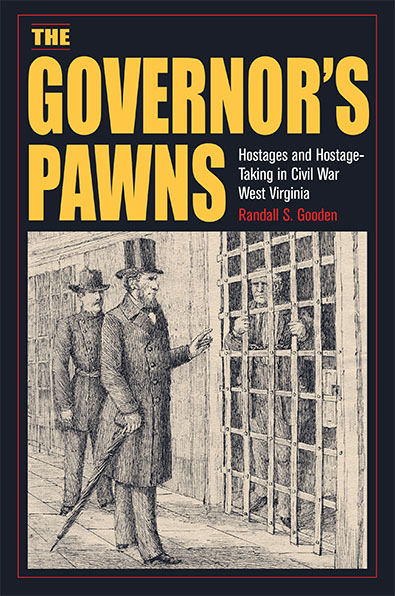Book Review: The Governor’s Pawns: Hostages and Hostage-Taking in Civil War West Virginia

 The Governor’s Pawns: Hostages and Hostage-Taking in Civil War West Virginia. By Randall S. Gooden. Kent, OH: The Kent State University Press, 2023. 264pp. Hardcover, $55.00
The Governor’s Pawns: Hostages and Hostage-Taking in Civil War West Virginia. By Randall S. Gooden. Kent, OH: The Kent State University Press, 2023. 264pp. Hardcover, $55.00
Reviewed by Jon-Erik Gilot
As a longtime archivist and records manager, I love when authors roll up their sleeves and utilize the archival record. Archivists spend their days arranging, preserving, and more often these days, digitizing records to make them accessible. We want people to use the records. As a former archivist at the Ohio Historical Society (Ohio History Connection) and curator at West Virginia’s crown jewel at the West Virginia & Regional History Collection, Dr. Randall S. Gooden appreciates the excitement and discovery of those “ah ha!” moments that come with archival research. And so it was at WVRH that Gooden discovered an aging envelope marked “Hostage Letters” that jumpstarted the research resulting in his most recent publication, The Governor’s Pawns: Hostages and Hostage-Taking in Civil War West Virginia.
While today the phrase draws connotations with terrorism, hostage-taking during warfare and diplomacy goes back to ancient times. Gooden deftly covers the history of hostage-taking from the 8th century BC to its history in North America and up through 1863’s General Order 100, which for the first time forged rules for the practice of hostage-taking. While commonplace during the Civil War, West Virginia was unique in that the fledgling state government and Governor Arthur Boreman practiced state-sponsored hostage-taking, and went so far as codify it in state law.
Gooden traces the longstanding sectional and geographic differences between eastern and western Virginia, ultimately leading to the fracture of the state. On the eve of statehood, the pro-Union government at Wheeling passed their own hostage law, which allowed for the retaliatory taking of hostages to be held in exchange for pro-Union civilian hostages, as well as for the arrest and detention of suspected disloyal persons.
Utilizing the correspondence culled from archival research, the author chronologically examines various hostage cases from around the state and includes a helpful appendix timeline following not only the instances of hostage-taking but also of pertinent political and military events throughout West Virginia from 1860 – 1872. Beyond detailing the hostages and their experiences, Gooden expands the scope of his work to include the impact of hostage-taking on families and communities, friends and enemies alike. Many of these hostages endured long periods of confinement at the Athenaeum military prison in Wheeling, where one hostage, George Buchanan, ultimately died. Buchanan’s family later unsuccessfully brought suit against Governor Boreman for damages in his death.
What especially appealed to this reviewer was the scope and breadth of Gooden’s research. Rather than confine himself to the more recognizable West Virginia locales and personalities, he instead covered geographic areas, raids, military units and individuals that have been otherwise overlooked in modern Civil War historiography. Units like the West Virginia Independent Exempts, Independent Scouts, Virginia State Line, Moccasin Rangers, and Swamp Dragons; the Jones-Imboden and Berkeley Springs raids, as well as smaller engagements along the South Branch, Little Kanawha, Middle Island Creek, and Tygarts tributaries. The experiences of local sectional politics, family rivalries, irregular/partisan warfare, and the practice of hostage-taking brought the Civil War home to the communities that existed on the periphery of West Virginia and distant from the battlefields.
In a rare year that has seen multiple books published relating to the Civil War and West Virginia statehood, this is one that deserves a place on your bookshelf.
I’m glad Dr. Gooden wrote this book, it is a subject I’ve been looking at for some time now. The hostage act of 1863 was just the tip of the iceberg. The Wheeling government has never had a light shown on its activities. Mark Neely made a mistake in his “The Fate of Liberty” when he said the Camp Chase records had been lost. They hadn’t, and I have gone through most of the existing books. There are about 1700 civilian prisoners recorded there, most without any charges, and most of them are men of voting age. One in every twenty voters in Doddridge County ended up in Camp Chase. Many civilians were jailed in Wheeling and never made it to Camp Chase. At a minimum 2000 West Virginia civilians were arrested and imprisoned without trial by both Union forces and the Wheeling government. The practice on the civilian population of course created fear, which is a useful tool when it comes to repressing opposition. The Weekly Register in Mason County complained about the low turnout for the constitution vote in 1862- “It is then very plain to be seen that quite a large number of the people entitled to vote, failed to do so through fear or some other cause, and if we had the time and space we would like to pay our respects to them.” I like the implied threat at the end.